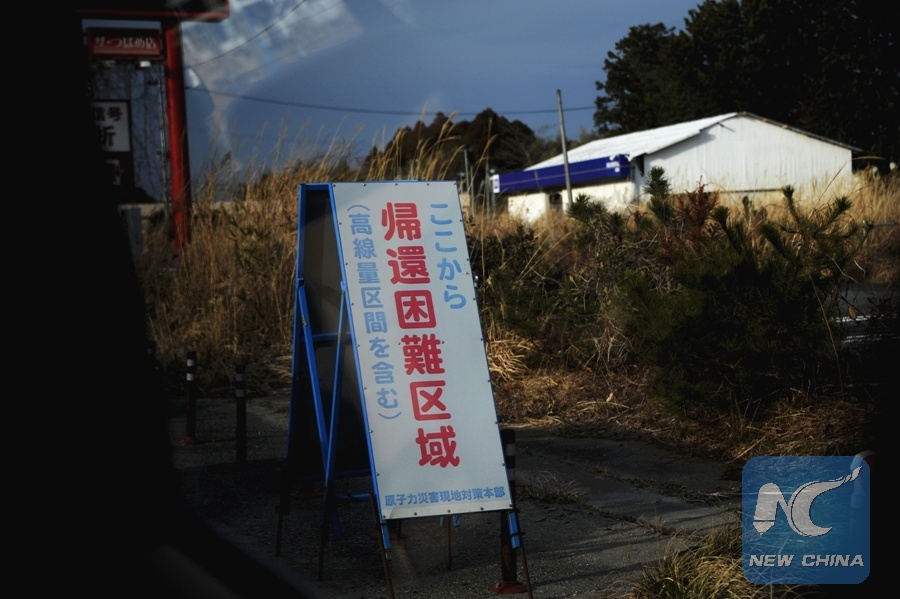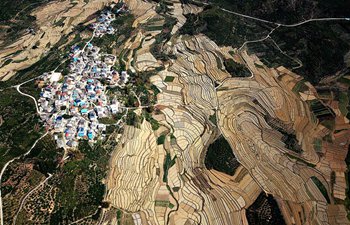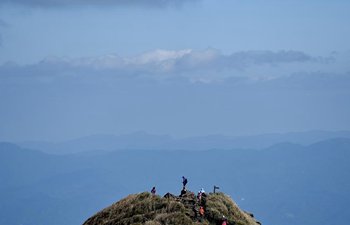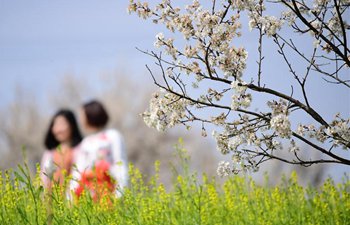
File Photo taken on Feb. 22, 2017 shows a warning sign at Okuma near the Fukushima Daiichi nuclear power plant, Fukushima Prefecture, Japan. (Xinhua/Hua Yi)
by Jon Day
TOKYO, March 11 (Xinhua) -- "Everyone used to call her 'Grandma.' She was one of the sweetest, kindest and most generous people you could ever hope to meet, especially under such appalling circumstances in Fukushima," Kana Fujimoto, a Tokyo-based volunteer recalled, sadly.
The 31-year-old volunteer for the Save Minimisoma Project referred to a senior widow, who she came across, in the project hosting the victims of the massive earthquake and the ensuing tsunami and nuclear disaster on March 11, 2011.
However, "Grandma" has already passed away.
"She had a toothy smile that could warm you from the inside out, words of wisdom that would provide pause for thought in such a time of sheer turbulence and, there was always a handful of candy available to kids, whose lives had also been uprooted and turned upside down," Fujimoto told Xinhua.
The project has run its course providing emergency relief supplies to the thousands who were somewhat unceremoniously dumped into small "temporary shelters" in Fukushima Prefecture comprising rows of camp-like wooden huts, since the disasters took place seven years ago.
A contingent of Tokyo-based volunteers like Fujimoto, joined with local outreach groups and continued their work since then.
In recent times, essentials such as food, fresh water and vegetables were no longer the priority and the majority of those placed in shelters had been moved into regular subsidized accommodation.
For the elderly victims of the disasters, however, the real crisis for them was still unfolding on a daily, weekly and monthly basis, with the ultimate conclusion being the very bleakest imaginable.
Many individuals and families from the hardest hit areas like Miyagi, Iwate and Fukushima, even if they had to do a stint in temporary accommodation, through family and work connections had managed to restart their lives in other parts of the country.
"And while the disasters for many will forever haunt their memories, they're safe in the knowledge that now, life is as normal as it can be and they are fully-functioning members of society," anthropologist and sessional lecturer, Keiko Gono, told Xinhua recently.
"But for the elderly people who did not have the resources or the will, for that matter, to fully leave their hometowns and for some even on a psychological level, it meant they have been permanently displaced albeit physically and/or mentally," Gono explained.
While it is hard to quantify because there is no pathology for "death by isolation," "or death by loneliness," she firmly believes that a staggering number of seniors passed away before their time simply due to a lack of social care, connection and sense of community.
For an 87-year old like "Grandma," for example, to be told that she had no choice but to leave the home she built with her husband, the family farming business, the neighbors and broader community she so fondly associated with, and suddenly find herself in an emergency shelter resembling an internment camp, the psychological effects would be damaging beyond belief.
According to the latest statistics conducted between December and February this year, in the seven years after the earthquake, tsunami and nuclear disaster, only 4 percent said they had recovered their community bonds, while just 15 percent from the hardest-hit areas said they had regained their communities, but only to some extent.
Gono explained that these numbers were probably just the tip of the iceberg, as typically speaking and as per Japanese culture and norms, Japanese seniors would be far less likely to complain about their situation if it meant a trouble to others.
This area has been one of the government's biggest failings, and the phenomena of senior social isolation and death from loneliness have been allowed to slip through the cracks, said the anthropologist.
The fact that professional counseling and mental health services are woefully lacking for these seniors who have lost spouses, seen families relocate and barely visit, and, bluntly speaking, are utterly isolated with all dreams of ever returning to their homes dashed, is nothing less than shameful for the government here.
"Without serious intervention, these dear old people, through no fault of their own, will literally die alone," Gono said.
The statistics underscore this seemingly forgotten social injustice.
The numbers of people who lost everything in the disasters and died alone after being placed in temporary housing hit a record-high just last year.
According to official accounts, 63 people living unattended lost their lives in temporary accommodation. Of those 52 were in Miyagi and 11 of the isolated deaths were in Iwate prefecture.
The number of unattended deaths, unfathomably, rose by 27 cases when compared to the previous year, according to the statistics.
Since the disasters in 2011, officials figures showed that 235 people died in complete isolation and more than 80 percent of these possibly preventable deaths happened to people aged over 60.
"Grandma did everything she could to help others. For a while she could do her own shopping and when her shopping arrived there was always an extra radish or some tangerines for her neighbors, snacks for the kids, and, perhaps, most importantly, a smile for everyone that seemed to say 'you'll be ok. We'll be ok. We're in this together'," said Fujimoto.
"But the cruel irony of the situation was the older and more immobile Grandma became, the less people would see her. She was placed a long way from her friends, and if she didn't have the energy to go to the local store, she could go weeks without any human interaction," she explained.
Fujimoto added that there were a lot of good charities and outreach groups doing the very best they could to create inclusive environments, particularly for the youngest and the oldest who needed it most. But, funds were always short, and not all the volunteers lived in the area.
Fujimoto herself was commuting from Tokyo once or twice a week soon after the disaster, but had to scale back her volunteering due to the expense of traveling and her own family needs.
More recently, she managed to get there every other week as something was "different" about Grandma.
"She'd started saying things like she was lonely and wanted to be with her friends and that her husband had told her that she didn't need to live like this and that he was waiting for her with a smile," said Fujimoto.
"The last time I saw her, I could sense she could no longer battle the loneliness. From being such a vibrant community member to a forgotten soul was just not livable for her and heartbreaking for me," she said.
A few minutes passed as Fujimoto wept silently for the loss of a life that had meant so much to her and many other people.
There should have been more care available. Similar-aged people could be housed together with carers helping them interact, she said.
"This country should have done better," she said.













